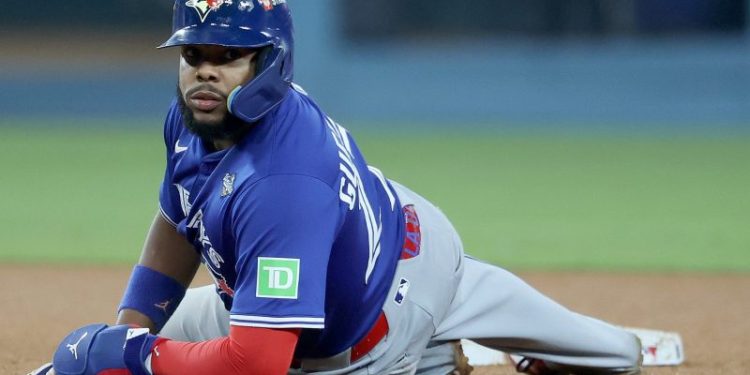USA TODAY Sports has live coverage ofDodgers vs. Blue Jays in World Series Game 4.

LOS ANGELES — As they trudged off the Dodger Stadium grass in the wee minutes of Oct. 28, the Toronto Blue Jays experienced feelings only a precious few ballplayers across a century of this game have confronted: Losing an 18-inning World Series game.
Hey, when it’s first team to four wins a world championship, every loss is costly. And the bill for this one will be exorbitant in Games 4 and 5.
Freddie Freeman’s home run leading off the bottom of the 18th inning didn’t just elevate the Dodgers to a 6-5 victory and a 2-1 World Series advantage. It also exacerbated the many problems Toronto will face both getting back in this Series and, against the odds, reclaiming the upper hand.
Not that the Blue Jays are focusing on that. Manager John Schneider is the master of cheerfully refusing to consider what just happened might impact what will happen.
“The Dodgers didn’t win the World Series today. They won a game,” says Schneider in his postgame dissection, long after the clock struck midnight on the West Coast.
“These guys are going to be ready to go tomorrow. I love the way we played. I love the way we fought.”
Schneider is rightfully proud of his dudes but it’s probably not a bad idea to peek under the hood and ponder the Jays’ reality.
They have a Shohei Ohtani problem: The game’s greatest player didn’t just reach base a record nine times in as many plate appearances, drop two home runs and two doubles on Toronto and still go to bed dreaming of dominating them on the mound.
He also illustrated the problems of pitching around him. Sure, it took 18 innings, but turn over that Dodger lineup enough, and eventually a former MVP will come around to beat you if you insist Ohtani doesn’t.
“Again, man, the guy’s a great player,” says Schneider. “There’s certain times where I feel like you feel better about someone else beating you. If that someone else is Mookie Betts or Freddie Freeman, it still stings.
“It’s not the easiest thing in the world to just walk him and face Mookie and Freddie.”
Says Toronto third baseman Ernie Clement: “He’s the best player to ever play this game. Reaching base nine times – I think I was 1-for08, so wish I could take a couple of those from him. It’s amazing.
“You can’t let him beat you. We intentionally walked him, pretty much, four times, at least. It’s a no-brainer.”
They have a pitching problem: Game 4 starter Shane Bieber has averaged just 4 ⅓ innings in his three playoff starts this season, all against lineups not nearly as potent as the Dodgers’. Now, consider the state of the relief corps – all of whom pitched in Game 3 – that will align behind him.
Long man Eric Lauer pitched a gallant 4 ⅔ innings, keeping Toronto alive between innings 12 through 16, requiring 68 pitches. Closer Jeff Hoffman pitched two innings, burning 33 throws.
Five other relievers threw between 19 and 29 pitches, and while you can say the Dodgers also had to cover 18 innings, will also have pitchers down because of it, they also have something Toronto does not:
Shohei Ohtani, starting Game 4.
No wonder the Blue Jays will, even more than usual, place “unavailable” on its banned list of words this week.
“Honestly, I think almost everybody’s going to be ready to go tomorrow,” says Lauer, who might be whisked away by pitcher’s protective services, if such an entity exists, should he throw a pitch in Game 4.
“It’s the World Series: Nobody wants to miss an inning, no one wants to be down. Do whatever you can to get yourself ready tomorrow and ready to go.”
And they have a health problem: DH and leadoff man George Springer, whose body was already compromised in multiple fashions, left the game after wrenching his left side on a swing in the seventh inning. He underwent an MRI.
Second baseman Bo Bichette has made significant contributions in this Series since returning from a 48-day absence due to a knee ligament strain. Yet he’s also far from 100% and is replaced either by a pinch-runner or on defense late in games.
Springer’s exit and Bichette’s limitations burned the Blue Jays in Game 3, with massive holes in the lineup creating the impression they might never score again.
And for the last 11 innings of Game 3, they didn’t.
“We owe them some runs tomorrow, for sure. We’ll get on that,” says Clement.
Postseason pitching is already a different, uncaged animal, and the World Series is its most extreme example, since there truly are no tomorrows. Toronto was prepared, mentally, to adjust to whatever role might come before its pitchers.
As the 17th and 18th innings unfolded, there were crazy sights to behold in the Dodgers’ and Blue Jays’ bullpens: Yoshinobu Yamamoto, the Dodgers’ Game 2 winner who threw a complete game two days before, getting ready to come in if necessary.
And Shane Bieber, Toronto’s Game 4 starter, likely getting tapped to pitch the 19th inning, if it got that far.
It didn’t. And now, Toronto’s pitching problem is not mental adjustments to playoff ball but rather a physical one, pondering limitations and efficacy as it aims to win three of the next four games.
“This is playoff baseball. You saw who was getting ready in their bullpen. And who was getting ready in ours,” says Blue Jays Game 2 starter Kevin Gausman. “That just shows you this time of year is a little different. And playing that long of a game is a little different.
“Throw all your normalities out the window when it comes to this time of year.”
Oh, Game 3 was plenty abnormal. Stay tuned for the fallout.







